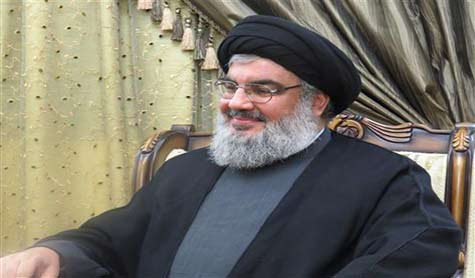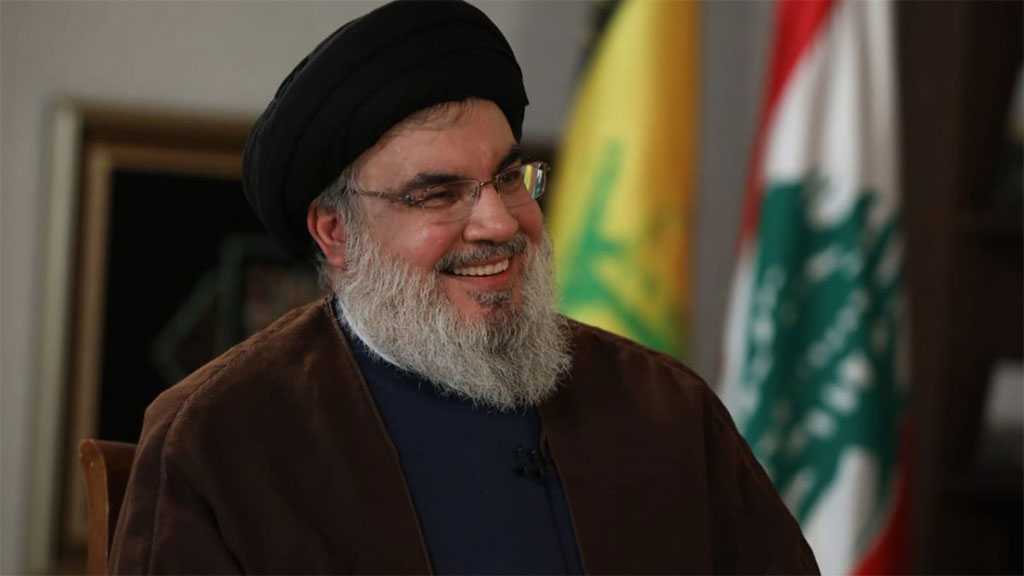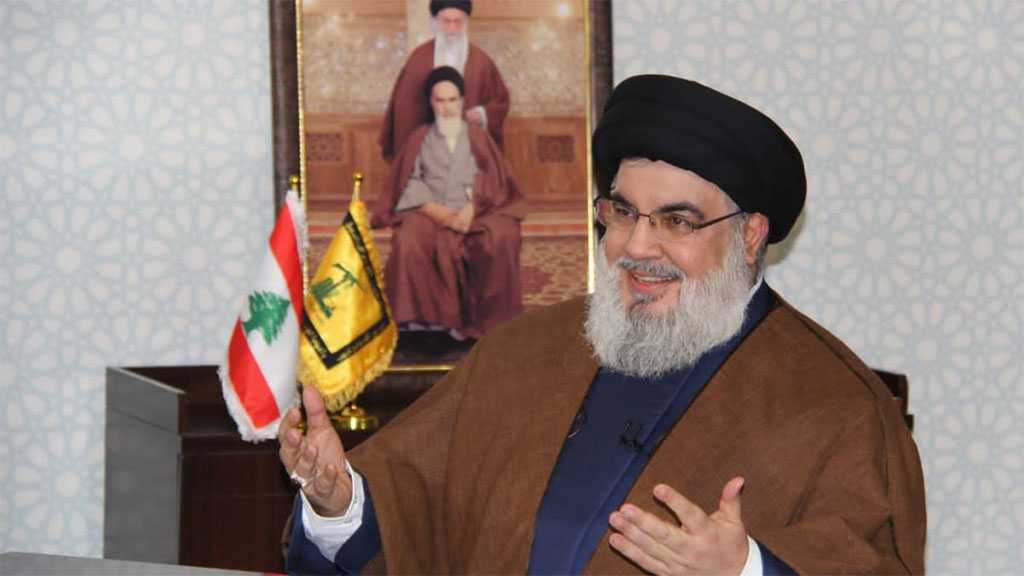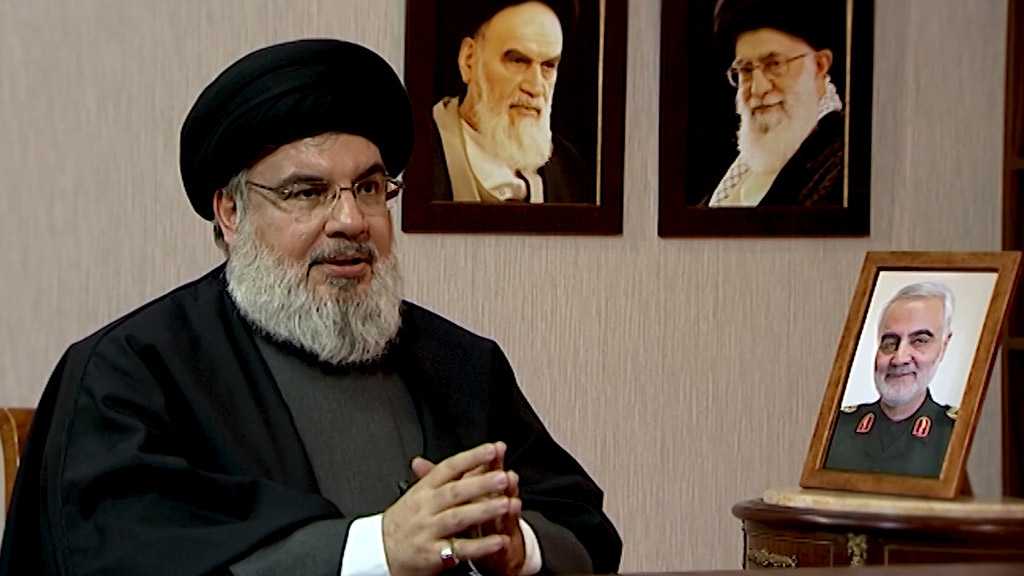
Sayyed Nasrallah: Resistance behind Shebaa Bomb, “Israeli” Eye on Galilee

Local Editor
Hizbullah Secretary General, His Eminence Sayyed Hassan Nasrallah,
unveiled that the resistance was behind the bomb which targeted an
"Israeli" patrol in Shebaa Farms in mid-March.

He stated that the bomb was only part of response to the "Israeli" raid which targeted a resistance base in Janta region [located in the Bekaa valley on the Syrian borders].
During an all-inclusive interview with as-Safir Lebanese daily, Sayyed Nasrallah noted "the ‘Israeli' enemy got the message well... the issue here is not about rules of clash [with the Zionist enemy], but is rather about deterrence."
Sayyed Nasrallah measured that through its raid on Janta, the Zionist entity was testing the ability of resistance to benefit from the current situation, particularly Hizbullah's involvement in the battle in Syria, in a bid to change the rules of clash.
His Eminence said, "When we had planted the bomb in Labbouneh [in August 2013], we had several goals, among which was to deliver a message to the enemy that we do not allow you to change the rules of clash. Wherever you enter- and we know- we will confront you."
Moreover, Sayyed Nasrallah pointed out that if the resistance kept silent following the raid, "the enemy might strike any truck, house or any other target in any place [in the future] under the pretext that ‘Israel' is committed to strike qualitative weapons."
Answering a question by As-Safir, the Hizbullah Secretary General ruled out a new "Israeli" war on Lebanon. He assured that the course of events in Syria raises concerns of the "Israelis."
According to Sayyed Nasallah, following these developments, the "Israelis" are raising questions about whether this experience will enable Hizbullah to adopt new courses in battle if a new war takes place [with the Zionist entity].
Adding to this point, Hizbullah SG underscored that "Israel" has its eye set on the (al-Jalil) Galilee.
Meanwhile, Sayyed Nasrallah considered that the risk of terrorist bombings in Lebanon has considerably dropped, stating that the resistance is not facing a problem with its supporters over the involvement in the Syrian war.
"On the contrary, some of those who were hesitant have now made their choice to support us," Sayyed Nasrallah further elaborated to as-Safir, adding "some of March 14 public support our intervention in Syria in order to protect Lebanon from Takfiri terrorist groups."
His eminence pointed out that the danger of the Syrian regime falling has come to an end.
"They can launch an extensive war as long as some states are still funding, arming and inciting. Yet, nothing indicates that the opposition in Syria is capable of launching a massive war; as the course of events in Lattakia and Kassab cannot be called a massive war."
Sayyed Nasrallah said that, "The great battle which they have talked about, starting from Syria's south is closer to intimidation than reality, noting that "the experience during the last three years has proven the Syrian regime is not weak and that it also enjoys popular incubation."
The Resistance leader stressed that the major issue Hizbullah is concerned about is for the Syrian war to end, underscoring "we have passed the danger of partition."
He disclosed that serious offers were presented to [Syrian] President [Bashar] al-Assad to cut ties with Iran and resistance movements, and to seriously head to total settlement with "Israel." However, President Assad refused, and "the stance he made should be recognized."
On a related note, Sayyed Nasrallah pointed out that many Arab countries had contacted the Syrian regime under the table saying, "We support you, stay firm."
He added, "I even know some Arab countries that pretended to support the opposition, yet they would ask the regime- under the table- to find a decisive and swift solution quickly."
Concerning the Russian stance on Syria, Sayyed Nasrallah noted that Russia, after Crimea's crisis, has become more firm and will increase its "support and protection to Syria."
As for his view on the "Arab Spring," he said, "We had understood that the events in Tunisia, Libya and Egypt were a mere popular movement that surprised the [Arab] regimes as well as the Americans, French, and the entire international community."
"Later on, the need for leadership and planning paved the way for parties and movements to take advantage of the situation and intervene," he explained.
Sayyed Nasrallah highlighted that before the entire issue of the so-called "Arab Spring," there has been serious discussion among the Americans-France and Britain were also involved in the discussion- in supporting the view of [dividing the region].
"The source to such information is a Gulf state, which uncovered there has been a discussion on the necessity of dividing Saudi Arabia into several countries."
Source: As-Safir newspaper, translated by website team
Comments


![Gen. Soleimani: Sayyed Nasrallah’s Entire Existence Is Sincerity… I Love Him [Documentary]](https://english.alahednews.com.lb/uploaded2/images/20220908122823.jpg)
